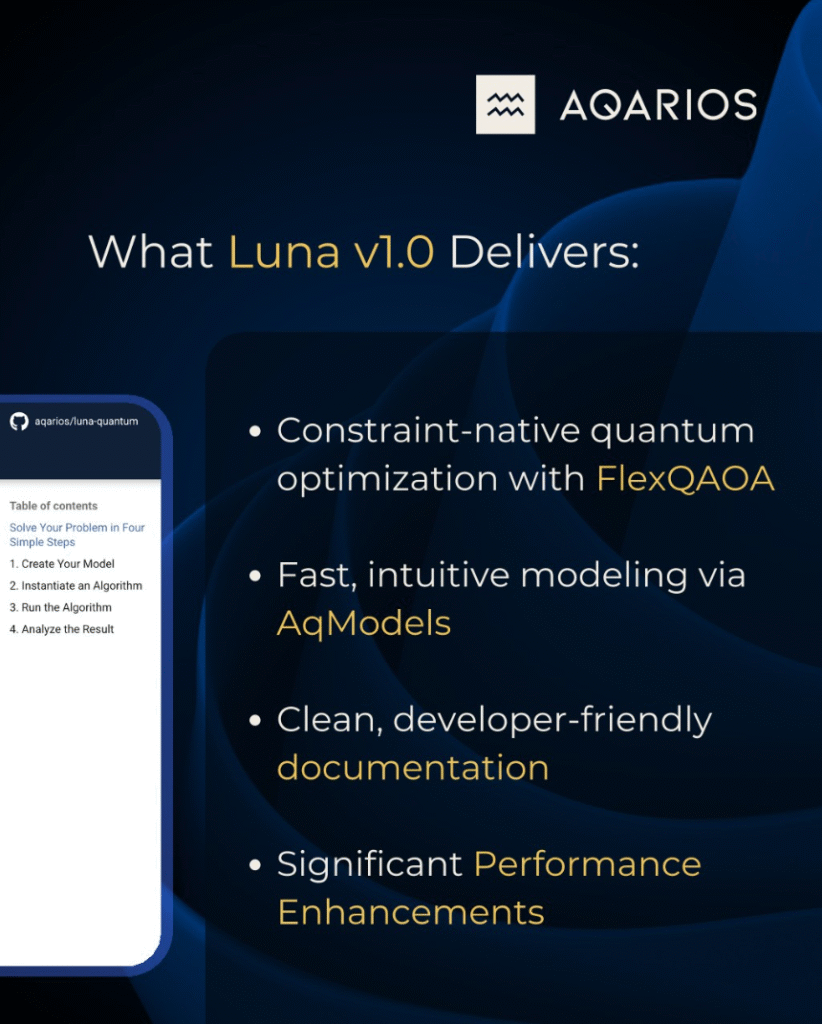Aqarios has officially launched version 1.0 of its Luna platform, a significant milestone in its mission to provide accessible, scalable quantum optimization tools. The Munich-based quantum software company introduced this release as a robust upgrade to its earlier v0.9 version, incorporating major performance improvements, enhanced usability, and broader support for real-world optimization scenarios. Luna v1.0 is designed to enable users—including those without quantum computing expertise—to build, test, and deploy optimization models across industries such as logistics, energy, finance, and manufacturing. The update also introduces a redesigned documentation portal and a fully integrated modeling framework, AqModels, aimed at simplifying end-to-end workflows.
At the core of the Luna v1.0 release is the debut of FlexQAOA, a constraint-aware variant of the Quantum Approximate Optimization Algorithm. Unlike traditional QAOA, which requires constraints to be translated into penalty terms, FlexQAOA embeds them natively into the quantum circuit. It uses XY-mixers to enforce one-hot constraints and indicator functions to handle inequality conditions without auxiliary variables or slack terms. This architectural shift allows the algorithm to operate entirely within the feasible subspace, preserving problem structure and improving solution efficiency. The approach significantly reduces circuit depth and simulation complexity, making it better suited to near-term quantum hardware.
FlexQAOA has been benchmarked on complex optimization problems such as the multidimensional Knapsack problem, which includes both mutually exclusive choices and capacity constraints. At just a single QAOA layer (p=1), FlexQAOA matched the performance of the best baseline methods. With deeper circuits (p=10), it consistently achieved optimal or near-optimal solutions across all test instances. By maintaining a compact, constraint-respecting solution space, FlexQAOA avoids the inefficiencies and distorted landscapes introduced by QUBO reformulations, enabling faster convergence and improved accuracy.
The Luna platform itself introduces additional innovations designed to support real-world adoption. AqModels allows native model definition in Python, removing the need for external formats and simplifying execution across quantum, classical, or hybrid backends. The developer experience has been enhanced through a fully rebuilt documentation portal, including API references, step-by-step tutorials, and interactive examples. Under-the-hood improvements to job handling, backend performance, and hybrid solver integration further strengthen Luna’s readiness for enterprise and academic users alike.
By releasing Luna v1.0 with FlexQAOA, Aqarios aims to close the gap between quantum algorithm research and practical industry deployment. The platform is now available to all users, with support for both academic and commercial applications. Future development will expand FlexQAOA to accommodate new constraint types, hardware-aware compilation, and hybrid quantum-classical workflows. Following successful simulation benchmarks, live QPU execution support is in preparation, positioning Aqarios as a key player in the push toward scalable, application-driven quantum computing.
Read the official Luna v1.0 announcement here, the FlexQAOA overview here, the full algorithm documentation here, the Luna platform introduction here, and the detailed research paper here.
June 4, 2025


